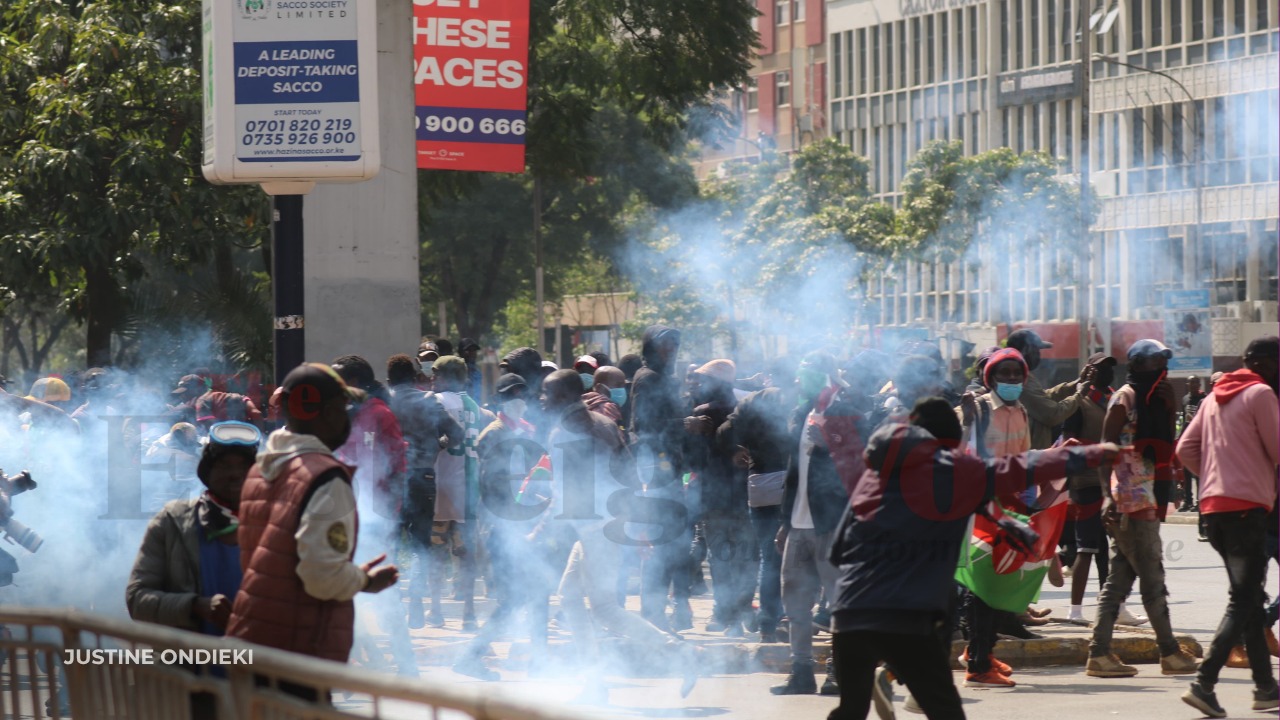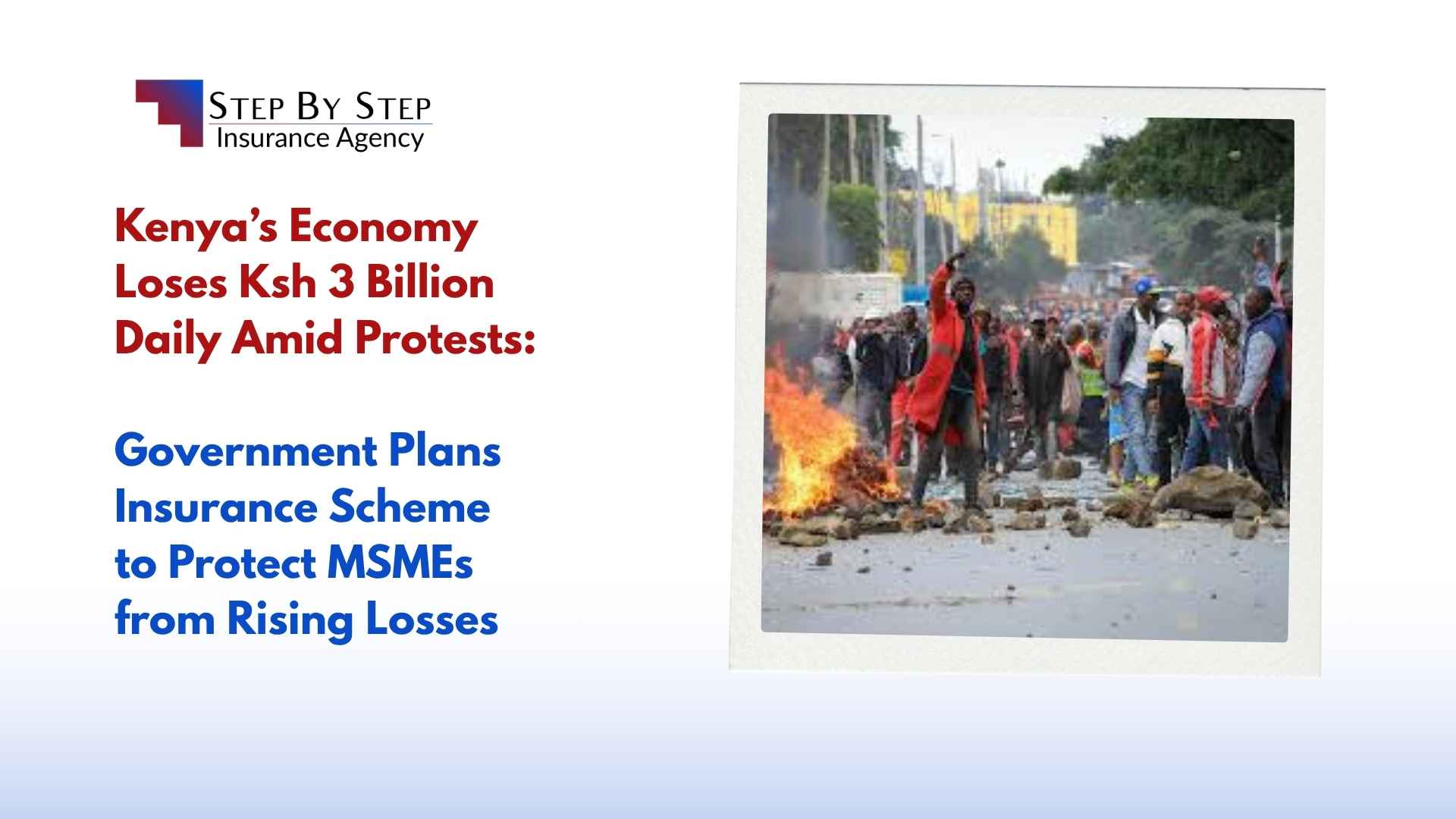Kenya’s Economy Loses Ksh 3 Billion Daily Amid Protests: Government Plans Insurance Scheme to Protect MSMEs from Rising Losses
Kenya’s insurance sector and broader economy are currently navigating turbulent waters. The recent wave of anti-government protests, which marked the one-year anniversary of last year’s unrest, has inflicted severe economic damage. The government estimates that these violent protests are costing the country a staggering Ksh 3 billion every day, with Micro, Small, and Medium Enterprises (MSMEs) bearing the brunt of the losses. In response, the government is exploring collaborative insurance solutions tailored to protect MSMEs from such shocks.
In this blog post, we will unpack the full impact of these protests on Kenya’s economy and insurance industry, detail the government’s proposed interventions, and explore how Step By Step Insurance can play a crucial role in helping MSMEs safeguard their businesses.
Key Takeaways
- Daily economic loss of Ksh 3 billion due to protests, with MSMEs most affected
- Over 60% of MSMEs remain uninsured, leaving them vulnerable to losses
- Government developing dedicated insurance scheme for MSME protection
- Protests disrupt supply chains, business operations, and investor confidence
- Insurance is a strategic investment for business resilience, not just a cost
Table of Contents
Join Our Insurance Community
Connect with other business owners and insurance experts to discuss trends, challenges, and solutions for protecting your enterprise in Kenya’s evolving economic landscape.
Join WhatsApp GroupThe Economic Toll of Kenya’s Protests

(Image Courtesy of News 18)
On June 25th, 2025, thousands of Kenyans took to the streets to commemorate the anniversary of the 2024 anti-tax protests that shook the nation. While initially peaceful, these demonstrations escalated into widespread vandalism and disruptions affecting at least 25 counties nationwide. The aftermath left rows of businesses damaged or shuttered, with MSMEs—already vulnerable due to limited resources and insurance coverage—suffering the most.
The government’s estimate of a daily loss of Ksh 3 billion underscores the scale of the economic disruption. This figure reflects not only direct damages to property and inventory but also lost income, halted operations, and a chilling effect on investor confidence. As the backbone of Kenya’s economy, MSMEs’ struggles ripple through communities and the broader market, threatening jobs and livelihoods.
Economic and Social Impact of the Protests
The protests’ impact extends beyond immediate physical damage. The unrest disrupted supply chains, blocked transportation routes, and caused widespread business closures. In Nairobi’s central business district and other urban centers, many shops, banks, and service providers closed their doors for safety, compounding economic losses.
Socially, the protests have deepened political tensions and exacerbated grievances among Kenya’s youth, who cite high unemployment, the high cost of living, and perceived government corruption as core issues. Tragically, the protests have also resulted in fatalities and injuries, with at least sixteen deaths reported during the 2025 demonstrations alone.
The economic fallout is evident in rising nonperforming loans as affected businesses struggle to repay debts. The construction and real estate sectors have seen declines, while agricultural output suffered due to transport disruptions. Investor confidence has wavered, with the Nairobi Securities Exchange experiencing volatility and foreign investors growing cautious.
Challenges Facing the Insurance Sector
The insurance industry in Kenya now faces a dual challenge: a surge in claims related to protest damages and the difficulty of managing risk in an environment marked by political instability. MSMEs, which account for a significant portion of the economy, are particularly exposed because over 60% remain uninsured. This low insurance penetration leaves many businesses vulnerable to total loss in times of crisis.
For insurers, pricing and underwriting risks tied to civil unrest is complex and costly. The unpredictability of protests and the scale of damages make it difficult to set premiums that are both affordable for MSMEs and sustainable for insurers. Additionally, the rise in claims increases the risk of disputes and fraudulent claims, further straining the sector.
Government Response and Proposed MSME Insurance Plan
Recognizing the severe economic damage and the vulnerability of MSMEs, the Kenyan government is actively exploring interventions to cushion private sector players from losses due to violent protests. A key proposal is the development of a dedicated insurance scheme tailored specifically for MSMEs.
The government plans to facilitate the registration of MSMEs to improve coordination and data collection, which are essential for effective risk assessment and insurance coverage. This initiative aims to overcome one of the biggest hurdles: the lack of reliable data on MSMEs, which complicates underwriting and policy design.
However, the government and insurers face challenges in encouraging uptake, given the historically low insurance awareness and affordability issues among MSMEs. The success of this plan will depend on designing accessible, affordable products and effective outreach.
Potential Features of the Government’s MSME Insurance Plan
The envisioned MSME insurance scheme is expected to cover losses from property damage, business interruption, and risks related to civil unrest and vandalism. To make this viable, a public-private partnership model is likely, where the government facilitates and supports insurers who underwrite the risks.
| Key Features of Proposed MSME Insurance Plan | |
|---|---|
| Affordable Premiums | Subsidies or risk-sharing mechanisms to keep costs manageable for MSMEs |
| Simplified Claims | Streamlined procedures tailored to the limited administrative capacity of small businesses |
| Technology Integration | Digital platforms for registration, premium payments, and claims to enhance accessibility |
| Risk Management | Education and advisory services to help MSMEs reduce risks and prevent losses |
| Comprehensive Coverage | Protection against property damage, business interruption, and civil unrest |
Such a scheme would not only protect MSMEs but also contribute to economic resilience by stabilizing a vital sector during periods of unrest.
How Step By Step Insurance Can Help MSMEs

(Image Courtesy of Eastleigh Voice)
Step By Step Insurance Agency stands out as a key player in supporting MSMEs to navigate the insurance landscape, especially in these challenging times. With deep expertise in microinsurance and SME-focused products, Step By Step offers tailored solutions that address the unique risks faced by small businesses in Kenya.
Affordable and Tailored Insurance Products
Step By Step provides a range of budget-friendly insurance products designed to cover essential risks such as fire, theft, liability, and business interruption—risks that MSMEs are particularly exposed to during protests and civil unrest. Recognizing that cost is a major barrier, their products are structured to be accessible even to the smallest enterprises.
Specialized Cyber Insurance
As more MSMEs adopt digital tools, cyber risks have become a growing concern. Step By Step offers specialized cyber insurance products that protect against data breaches, cyberattacks, and online fraud—threats that can cripple small businesses without adequate protection.
Personalized Advisory and Risk Management
Beyond selling policies, Step By Step provides personalized advisory services. They help MSMEs understand their specific risks, select appropriate coverage, and implement risk mitigation strategies. This hands-on approach empowers businesses to not only insure but also manage risks proactively.
Leveraging Technology for Accessibility
Step By Step uses digital platforms to simplify insurance processes—from registration to claims filing—making it easier for MSMEs to access and manage their insurance. This reduces administrative burdens and speeds up response times when claims arise.
Commitment to Inclusivity
Step By Step is committed to ensuring no MSME is left unprotected due to cost or complexity. Their focus on education and outreach helps raise insurance awareness, fostering a culture of risk protection among Kenya’s small business community.
| Essential Insurance Resources for MSMEs | |
|---|---|
| Why SMEs in Kenya Need Protection Against Economic Uncertainties | SME Insurance Trends and Expectations for 2025 |
Broader Implications for Kenya’s Economy and Insurance Industry
The protests and their aftermath highlight the critical need to strengthen Kenya’s insurance sector as a pillar of economic resilience. Political unrest and social tensions remain elevated risks, with fiscal consolidation efforts and upcoming elections likely to sustain protest activity.
Increasing insurance penetration among MSMEs is vital not only to protect individual businesses but also to stabilize the broader economy. A robust insurance market can help absorb shocks, maintain investor confidence, and support sustainable growth.
Regulatory reforms, technological innovation, and public-private collaboration will be key to expanding access to insurance. The government’s MSME insurance plan, combined with the expertise of agencies like Step By Step, represents a promising path forward.
Conclusion
Kenya’s recent protests have underscored the fragility of its economic and social fabric, particularly the vulnerability of MSMEs. With daily losses estimated at Ksh 3 billion, the urgency to protect small businesses from such shocks has never been greater. The government’s initiative to develop a dedicated MSME insurance scheme is a critical step toward cushioning the private sector from future unrest.
Step By Step Insurance Agency’s role in providing affordable, tailored insurance solutions and risk management support positions it as a vital partner for MSMEs navigating these uncertain times. By embracing insurance, MSMEs can build resilience, safeguard livelihoods, and contribute to Kenya’s broader economic stability.
For MSMEs, the message is clear: insurance is not just a cost but a strategic investment in the future. With the right support and products, Kenya’s small businesses can weather the storms of civil unrest and emerge stronger.
This comprehensive look at Kenya’s current challenges and solutions in the insurance space highlights the importance of collaboration, innovation, and inclusivity. As the nation moves forward, protecting MSMEs through effective insurance will be key to securing a stable and prosperous economic future.
External References
Get Expert Insurance Guidance
Protect your business against unexpected disruptions with tailored insurance solutions



